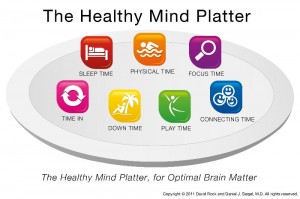
Seven daily essential mental activities to optimize brain matter and create well-being by Dr. Dan Siegel.
Many parents, some 15%-20%, suffer from perinatal mood disorders including postpartum depression. These disorders are an expression of stress- overload. There are many reasons why parents are vulnerable to stress after childbirth. When the demands of parenthood outweigh internal and external resources, over time, the result can be anxiety and depression. Not enough sleep, isolation, the constant demands of an infant, shifts in hormones, irregular meals, a colicky baby, a traumatic birth… the list of stressors is long.
If you think you may be suffering from postpartum depression or anxiety, it is important to ask for help from family, friends and a trusted healthcare professional. In addition to conventional treatments, there are ways to boost your resources and your mood— especially by engaging in activities that make you feel more relaxed, connected, and integrated. It is essential to take care of yourself, so you can care for your child.
This platter contains the seven essential daily mental activities necessary for optimum mental health in daily life. These seven activities make up the full set of ‘mental nutrients’ that your brain needs to function at it’s best. By engaging regularly in each of these servings, you enable your brain to coordinate and balance its activities, which strengthens your brain’s internal connections and your connections with other people. — Dr. Dan Siegel
Focus Time
When we closely focus on tasks in a goal-oriented way, we take on challenges that make deep connections in the brain.
Play Time
When we allow ourselves to be spontaneous or creative, playfully enjoying novel experiences, we help make new connections in the brain.
Connecting Time
When we connect with other people, ideally in person, and when we take time to appreciate our connection to the natural world around us, we activate and reinforce the brain’s relational circuitry.
Physical Time
When we move our bodies, especially aerobically, we strengthen the brain in many ways.
Time In
When we quietly reflect internally, focusing on sensations, images, feelings and thoughts, we help to better integrate the brain.
Down Time
When we are non-focused, without any specific goal, and let our mind wander or simply relax, we help the brain recharge.
Sleep Time
When we give the brain the rest it needs, we consolidate learning and recover from the experiences of the day.
I am going to go over each component in following weeks and show you how to incorporate them seamlessly into your life using lessons from yoga, both on and off the mat. Next week I will talk about Focus Time.
The Healthy Mind Platter was created by Dr. Daniel J. Siegel, Executive Director of the Mindsight Institute and Clinical Professor at the UCLA School of Medicine in collaboration with Dr. David Rock, Executive director of the NeuroLeadership Institute. For the overview and more great information go Dan Siegel
“May we all be safe, may we all be at ease, may we all be happy.”
Leave a Reply